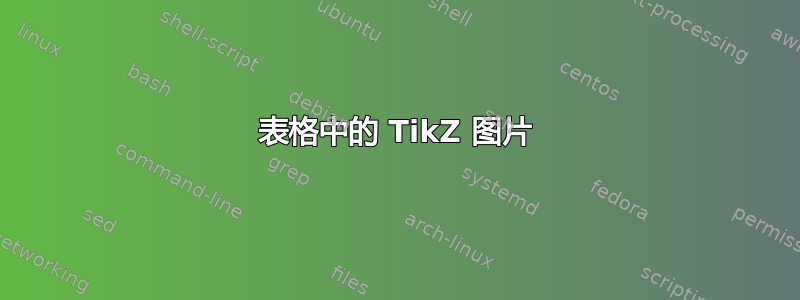
有人能帮我做表格吗?我希望 TikZ 图片的轮廓和表格线之间有距离。此外,非 TikZ 图片不居中。
这是我的 LaTeX 代码:
\documentclass[a4paper,10pt]{article}
\usepackage{tikz,amsmath, amssymb,bm,color}
\usetikzlibrary{circuits.logic.US,circuits.logic.IEC}
\begin{document}
\begin{table}
\caption{Test}
\label{de:Wahrheitstabelle_Bsp01}
\setlength{\tabcolsep}{5mm} % separator between columns
\def\arraystretch{1.25} % vertical stretch factor
\centering
\begin{tabular}{|c|c|c|}
\hline
Gatter & Funktion & CNF-Formel \\ \hline
\begin{tikzpicture}
\draw (-1.5,-0.75) rectangle (1.5,0.75) ;
\end{tikzpicture} & 0 & 1 \\ \hline
\begin{tikzpicture}[circuit logic US, logic gate input sep=4mm]
\node [or gate, inputs =nn] (a1) {};
\draw (a1.input 1) -- ++(left:5mm) node[left] {$x_{1}$};
\draw (a1.input 2) -- ++(left:5mm) node[left] {$x_{2}$};
\draw (a1.output)--++(right:5mm) node[right] {$x_{3}$};
\end{tikzpicture} & 0 & 1 \\ \hline
\begin{tikzpicture}[circuit logic US]
\node (a1) [not gate, inputs =n] at (0,0) {};
\draw (a1.input) -- ++(left:5mm) node[left] {$x_{1}$};
\draw (a1.output)--++(right:5mm) node[right] {$x_{2}$};
\end{tikzpicture} & $x_{2} \equiv \neg x_{1}$ & $(x_{2} \vee x_{1}) \wedge (\neg x_{2} \vee \neg x_{1})$ \\ \hline
\end{tabular}
\end{table}
\end{document}
这是我的表格:

答案1
要修复 tikzpicture 周围的垂直边距,可以使用fit库和特殊节点current boundind box。在下面的示例中,\addvmargin宏使用此方法。
要修复 tikzpicture 的垂直对齐,您可以使用baseline选项。在这里,我选择0作为第一个 tikzpicture 的基线,但您可以选择任何垂直坐标。在最后两个 tikzpicture 中,我选择任意节点作为参考。

\documentclass[a4paper,10pt]{article}
\usepackage{tikz,amsmath, amssymb,bm,color}
\usetikzlibrary{circuits.logic.US,circuits.logic.IEC,fit}
\newcommand\addvmargin[1]{
\node[fit=(current bounding box),inner ysep=#1,inner xsep=0]{};
}
\begin{document}
\begin{table}
\caption{Test}
\label{de:Wahrheitstabelle_Bsp01}
\setlength{\tabcolsep}{5mm} % separator between columns
\def\arraystretch{1.25} % vertical stretch factor
\centering
\begin{tabular}{|c|c|c|}
\hline
Gatter & Funktion & CNF-Formel
\\ \hline
\begin{tikzpicture}[baseline=0]
\draw (-1.5,-0.75) rectangle (1.5,0.75) ;
\addvmargin{1mm}
\end{tikzpicture} & 0 & 1
\\ \hline
\begin{tikzpicture}[baseline={(x3.base)},circuit logic US,logic gate input sep=4mm]
\node [or gate, inputs =nn] (a1) {};
\draw (a1.input 1) -- ++(left:5mm) node[left] {$x_{1}$};
\draw (a1.input 2) -- ++(left:5mm) node[left] {$x_{2}$};
\draw (a1.output)--++(right:5mm) node[right] (x3) {$x_{3}$};
\addvmargin{1mm}
\end{tikzpicture} & 0 & 1
\\ \hline
\begin{tikzpicture}[baseline={(x1.base)},circuit logic US]
\node (a1) [not gate, inputs =n] at (0,0) {};
\draw (a1.input) -- ++(left:5mm) node[left] (x1) {$x_{1}$};
\draw (a1.output)--++(right:5mm) node[right] {$x_{2}$};
\addvmargin{1mm}
\end{tikzpicture} & $x_{2} \equiv \neg x_{1}$ & $(x_{2} \vee x_{1}) \wedge (\neg x_{2} \vee \neg x_{1})$
\\ \hline
\end{tabular}
\end{table}
\end{document}


